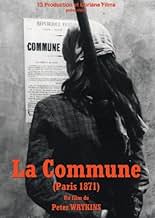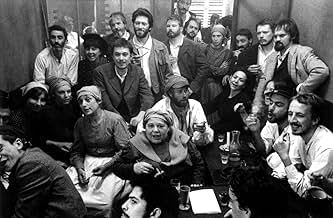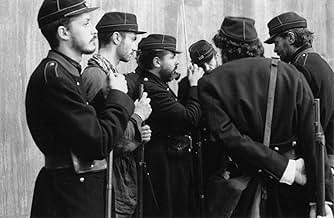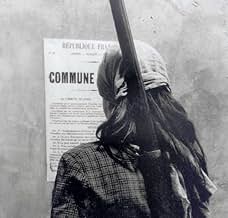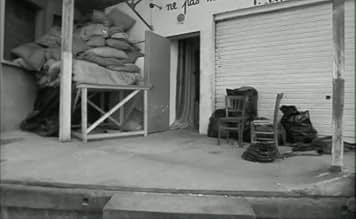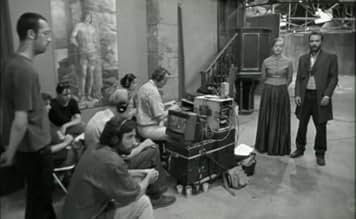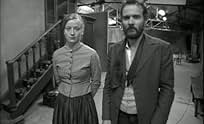La commune (Paris, 1871)
- 2000
- 5h 45min
NOTE IMDb
8,0/10
1,4 k
MA NOTE
Dans ce drame de guerre qui gomme la frontière entre documentaire et fiction, la classe ouvrière et la bourgeoisie parisiennes du 19e siècle sont interviewées et filmées par la télévision, a... Tout lireDans ce drame de guerre qui gomme la frontière entre documentaire et fiction, la classe ouvrière et la bourgeoisie parisiennes du 19e siècle sont interviewées et filmées par la télévision, avant et pendant un soulèvement d'ouvriers tragique.Dans ce drame de guerre qui gomme la frontière entre documentaire et fiction, la classe ouvrière et la bourgeoisie parisiennes du 19e siècle sont interviewées et filmées par la télévision, avant et pendant un soulèvement d'ouvriers tragique.
- Réalisation
- Scénario
- Casting principal
- Récompenses
- 1 victoire et 1 nomination au total
Avis à la une
I must admit, the first thing that caught my attention in the programme of Arsenal Movie Theatre was the length of the film - 345 min. I was intrigued and looked it up on the internet, starting with imdb, and became even more intrigued. So I saw the movie yesterday.
And I didn't regret it at all. (Although I had to struggle through German subtitles for the shorter German version of 300 min. The announced full one with English subtitles was stuck somewhere in Paris.)
It is probably one of the most unusual movies I've ever seen. It is even not really a movie, at least in the standard understanding of it (let alone the length of the thing). It is obviously a mind game, but a mind game so fine and intellectual, as well as passionate, thrilling and challenging, that it somehow makes you feel deeply involved in it emotionally, not forgetting for a single moment that it is a game and the whole idea is completely absurd.
Indeed, what can be more absurd than watching "breaking news" about Paris Commune of 1871, like we were all watching tv on 9.11 or when the war in Iraq was about to begin. "Versailles TV", "Commune TV". Journalists asking "What do you feel now? What hopes do you have now for the future of The Commune?". But all staged, actors sometimes telling the camera about the roles they are playing. Or discussing whether The Commune could have had future, or Russian revolution was successful despite Kronstadt uprising.
The shocking thing is that it feels real. Even though you perfectly understand that it can't. He's using the media and our perception of the media (which makes us question to what an extent can our senses be manipulated) as a frame for all the events happening and in a way alters our perception of history and of history happening now.
I'm still digesting the movie, it raises a lot of question and makes you think a lot. But I'm happy to know that Arsenal is planning Peter Watkins's retrospective. So Berliners will have a unique chance to see his other works. Which I'm looking forward to.
And I didn't regret it at all. (Although I had to struggle through German subtitles for the shorter German version of 300 min. The announced full one with English subtitles was stuck somewhere in Paris.)
It is probably one of the most unusual movies I've ever seen. It is even not really a movie, at least in the standard understanding of it (let alone the length of the thing). It is obviously a mind game, but a mind game so fine and intellectual, as well as passionate, thrilling and challenging, that it somehow makes you feel deeply involved in it emotionally, not forgetting for a single moment that it is a game and the whole idea is completely absurd.
Indeed, what can be more absurd than watching "breaking news" about Paris Commune of 1871, like we were all watching tv on 9.11 or when the war in Iraq was about to begin. "Versailles TV", "Commune TV". Journalists asking "What do you feel now? What hopes do you have now for the future of The Commune?". But all staged, actors sometimes telling the camera about the roles they are playing. Or discussing whether The Commune could have had future, or Russian revolution was successful despite Kronstadt uprising.
The shocking thing is that it feels real. Even though you perfectly understand that it can't. He's using the media and our perception of the media (which makes us question to what an extent can our senses be manipulated) as a frame for all the events happening and in a way alters our perception of history and of history happening now.
I'm still digesting the movie, it raises a lot of question and makes you think a lot. But I'm happy to know that Arsenal is planning Peter Watkins's retrospective. So Berliners will have a unique chance to see his other works. Which I'm looking forward to.
Almost 6 hours long, this epic and enlighten looked at revolt and innovative political popular innovation and inspiring uprising of the commune in 19th century Paris is long and starts slow. It is self-reflective, free and breaks the 4th wall since the first frame and increasingly throughout the film.
The first part focuses on the background and beginning of the revolt and resistance. It explains the inequalities, the education gap, the history and bourgeois, military and blue collar vantage points.
Themes of women rights and education are abundantly explored and counterpoints are somewhat given although the work is clearly socialism and rightly so.
Mainstream media, its biases and impact are explored and although historically TV reporting did not exist at that time. adds an element of modernness, contrasted with the black and white and first-time actors in characters with costumes and minimal decor. The clear and more subtle subterfuge and power of religious authority is well confronted. Same as the military might and oppression as necessity versus violent resistance and what violence entails.
The nonprofessional actors who have been instructed to research their historical characters, the history and facts and to speak their own mind are asked to come out of characters many times in the second, slightly longer part and the beauty and brillance of the film is now in full boom.
Actors and characters discuss turn of the millennium and other 20th century realities like other resistances, fights, wars, repression and innovations including technology. Television, internet, mobile phones and the rest are pacifiers or cause for more unrest? What are we fighting for today and how will it be tomorrow? What and why should we fight? How? Within with morale compass and rules? Many crucial questions are raised and many valid points advanced. All of them still relevant and real today as in 1999 or 1871.
A must-watch film for any conscious moviegoer or any worldwide school children. Enjoy, think, discuss, share.
The first part focuses on the background and beginning of the revolt and resistance. It explains the inequalities, the education gap, the history and bourgeois, military and blue collar vantage points.
Themes of women rights and education are abundantly explored and counterpoints are somewhat given although the work is clearly socialism and rightly so.
Mainstream media, its biases and impact are explored and although historically TV reporting did not exist at that time. adds an element of modernness, contrasted with the black and white and first-time actors in characters with costumes and minimal decor. The clear and more subtle subterfuge and power of religious authority is well confronted. Same as the military might and oppression as necessity versus violent resistance and what violence entails.
The nonprofessional actors who have been instructed to research their historical characters, the history and facts and to speak their own mind are asked to come out of characters many times in the second, slightly longer part and the beauty and brillance of the film is now in full boom.
Actors and characters discuss turn of the millennium and other 20th century realities like other resistances, fights, wars, repression and innovations including technology. Television, internet, mobile phones and the rest are pacifiers or cause for more unrest? What are we fighting for today and how will it be tomorrow? What and why should we fight? How? Within with morale compass and rules? Many crucial questions are raised and many valid points advanced. All of them still relevant and real today as in 1999 or 1871.
A must-watch film for any conscious moviegoer or any worldwide school children. Enjoy, think, discuss, share.
Peter Watkins stands at the base of a form of historical documentaries known as 'documentary reconstruction'. Lightly based on battle re-enactments, Watkins hires amateur actors to play the roles of common people in the Paris of 1871. Famine and civil unrest cause a popular revolution, supported by followers of Karl Marx. The people take power and form a Commune, a communist government. After a few weeks, the official Versailles government regains the city by force, and tens of thousands of people are executed.
Watkins' historical drama is based on the common people, which are shown in their everyday life. To do this, he introduced an anachronism: in the 1871 context, the people form a tv station. The Versaillais also have their official tv station. This way, the documentary becomes both a social project and a media experiment.
Watkins' historical drama is based on the common people, which are shown in their everyday life. To do this, he introduced an anachronism: in the 1871 context, the people form a tv station. The Versaillais also have their official tv station. This way, the documentary becomes both a social project and a media experiment.
Peter Watkins' nearly 6-hour long docudrama, "La Commune (Paris, 1871), is a surprisingly passionate and fast-moving lesson in history. It is also a brilliant demonstration of how history is shaped, and re-shaped, by the tellers of the tale.
Using the "You Are There" approach of earlier radio and TV days, Watkins has a male and female news team from "Commune TV" wandering through the poorest district of Paris inviting people to express their grievances against the state to the camera.
While the people bitterly suffer because of the government's inept defeat at the hands of the Germans during the Franco-Prussian War, their anger inspires solidarity for them throughout Paris, and although they briefly rise up and seize power, they are brutally put down in the end.
Ironically, during the course of their uprising, a TV monitor in the background features happy-talk "Versailles TV" news anchors, who continually vilify the Communards and rationalize the government's brutal acts of suppression.
"La Commune (Paris, 1871)" is a must-see for students of history, and a must-see for students of the media.
Using the "You Are There" approach of earlier radio and TV days, Watkins has a male and female news team from "Commune TV" wandering through the poorest district of Paris inviting people to express their grievances against the state to the camera.
While the people bitterly suffer because of the government's inept defeat at the hands of the Germans during the Franco-Prussian War, their anger inspires solidarity for them throughout Paris, and although they briefly rise up and seize power, they are brutally put down in the end.
Ironically, during the course of their uprising, a TV monitor in the background features happy-talk "Versailles TV" news anchors, who continually vilify the Communards and rationalize the government's brutal acts of suppression.
"La Commune (Paris, 1871)" is a must-see for students of history, and a must-see for students of the media.
Other viewers' comments (thus far) encapsulate most of my feelings about this amazing film (shot on high-quality B&W video, actually). I would add that La Commune divides naturally into two parts, and would be comparatively easy viewing on different nights. The most dramatic moments, obviously, are in the second half - not just the scenes of the Communards defending Paris, but seeing more of the actors commenting on the project, which is when Watkins' strategy of having them react "as" the people they are portraying rather than simply giving them lines to read, really pays off. Personally, I'm glad I was able to see the whole thing build up to those moments.
But however you decide to do it, see La Commune. It will move you and make you think about your (very real!) ability to be a political actor, to make a difference, to take control of your life, even in a terrible time like the present. To use a much overused word, it's empowering.
But however you decide to do it, see La Commune. It will move you and make you think about your (very real!) ability to be a political actor, to make a difference, to take control of your life, even in a terrible time like the present. To use a much overused word, it's empowering.
Le saviez-vous
- Versions alternativesIn December 2002 Peter Watkins started the editing of an abridged theatrical version. In a prologue he expresses his views on discovering that the production company, 13 Production, has financial links with the Lagardère Group (which sells Military Weapons through Matra), then he warns the audience about how much of the sequence shots and live debates from the original full-length movie have been lost in the process of reducing the running time by more than 2 hours to 3 hrs 1/2.
- ConnexionsFeatured in L'Horloge universelle : la résistance de Peter Watkins (2001)
Meilleurs choix
Connectez-vous pour évaluer et suivre la liste de favoris afin de recevoir des recommandations personnalisées
- How long is La Commune (Paris, 1871)?Alimenté par Alexa
Détails
Box-office
- Montant brut aux États-Unis et au Canada
- 5 340 $US
- Week-end de sortie aux États-Unis et au Canada
- 2 930 $US
- 6 juil. 2003
- Montant brut mondial
- 21 641 $US
- Durée5 heures 45 minutes
- Couleur
- Mixage
- Rapport de forme
- 1.66 : 1
Contribuer à cette page
Suggérer une modification ou ajouter du contenu manquant

Lacune principale
By what name was La commune (Paris, 1871) (2000) officially released in Canada in English?
Répondre

